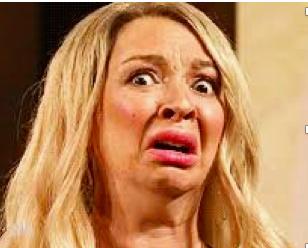It took very little effort to come up with some prime material this week. Crazies Readers started sending me some nice material. All I needed to do was write a little summary and make a few snotty comments. Neither of these required much thought.
- Loud Talkers Spread Diseases
Seinfeld fans will remember the "Low Talker" episode, where no one can understand a woman because she speaks so softly. Here's a news story about the opposite: "Loud Talkers Spread Disease."
Is there anyone out there who doesn't know (and probably despise) a "loud talker?" You know, the idiot talking on a phone or at the next table in a restaurant who makes you ponder "Hmm, maybe a violent murder in front of two dozen witnesses isn't such a bad idea after all."

Figure 1. The inverse proportion between speaking volume in public (in decibels) and intellectual aptitude as measured by college SAT scores.
Not only are these mutants profoundly annoying, but they also have another lovely trait. They are not simply content to damage your cochleas, they also excel in spreading infectious diseases!
A study from UC Davis found that not only are loud talkers profoundly annoying, but they also are better at spreading germs.

There is a strong correlation (r2 = 0.93) between loudness (Arms) and the number of infectious particles (N) emitted by the blabbermouths. For those of you who are not familiar with correlation graphs, 0.93 is a very good score. Source: W. Ristenpart, et. al., Scientific Reports volume 9, Article number: 2348 (2019)
Is there a solution to this problem?
Maybe.

Photos: (Left) Calibre (Right) Marc McPherson
2. The world's smallest gold coin. And it's REALLY small.
Switzerland has minted the world's smallest gold coin bearing the portrait of one of the world's biggest minds. The state-owned Swissmint announced that 999 Albert Einstein coins, each 2.96 mm (0.12 inches) in diameter, weighing 6.3 mg (1/500th of an ounce) will be sold for 199 francs ($205) each. They even throw in a magnifying glass so you can see the damn thing.

(Left) A really goofy image of Albert Einstein. The arrow shows the real size of the coin. (Right) By comparison, the silver three-cent piece was the smallest coin ever minted in the US (12 mm). The US Mint gave up in 1872 after 21 years because people kept complaining that they were losing them. I had one once. And lost it. Duh.
What kind of value are you getting for the "Albert?" Metallurgically, not much. Gold is now $1571/ounce, so the metal value of the coin is $3.14. But, if you're so inclined, feel free to spend 65-times too much for something you're going to lose in 12 seconds.
3. Old Pee is Good for Your Garden. So is Recycled Pee. Just not new pee.
Aged wine and beef are nothing new, but here's something that's "old and gold" - aged urine. Well, that's not quite right, because if it's aged it can't really be new. And recycled pee? Tell me that this doesn't conjure up images of people collecting the stuff and running it through again.

Photo: Gfycat
And, if you wanted to recycle it where would you keep it? I believe some innovation is required here. Maybe this...

The SleePee Easy Modified Water Bed® From $599 at SleePees Mattresses. Save the world, one dribble at a time. Urinal sold separately.
So, why is old pee good? It turns out that this is a legit study from the University of Michigan, which examined whether aged urine retained bacterial plasmids that would carry known antibiotic resistance genes into the environment. It doesn't, so feel free to collect pee in your water pee bed and use it to fertilize... maybe the peas in your garden. You could even start your own brand.





